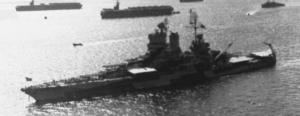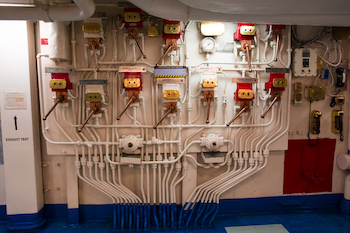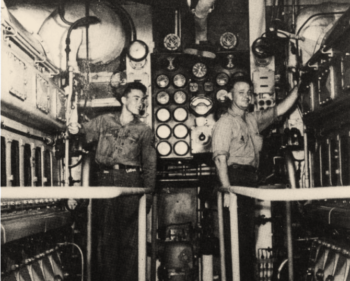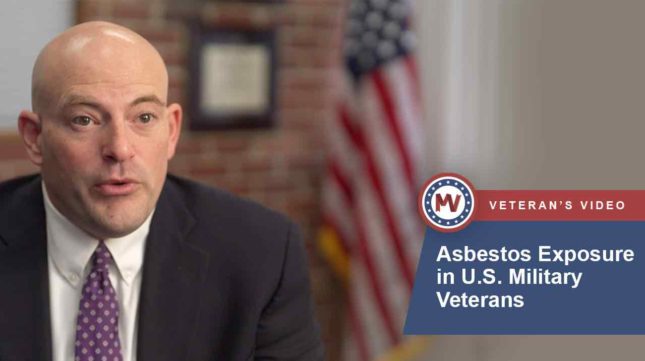The United States Navy used asbestos in shipbuilding for decades. The general public didn't know that asbestos on escort carriers and other ships was a carcinogen. This meant that thousands of sailors aboard Navy vessels like escort carriers were exposed to asbestos and later developed mesotheliom. We can help eligible veterans harmed by asbestos on escort carriers get benefits, medical care, and compensation.
Asbestos and Escort Carriers Explained
Like destroyers, frigates, and aircraft carriers, escort carriers made up a large part of the U.S. Navy. This was particularly true during World War II when many battles were waged on the seas.
As with all other Navy ships, Navy escort carriers (CVEs) needed to be protected against fire and excessive heat. This was especially important in the boiler and engine rooms.

Asbestos was considered a safe and cheap alternative to other materials. In fact, during World War II, asbestos insulation was a mandated part of shipbuilding for escort carriers.
The Navy banned the use of asbestos in the early 1980s when the risks became publicly known, but thousands had already been exposed.
Thankfully, veterans with mesothelioma, lung cancer, or other asbestos-related diseases can get military benefits from the U.S. Department of Veterans Affairs (VA) and seek legal compensation. Learn more in our Free Veterans Packet.
List of Escort Carriers With Asbestos
Over 100 escort carriers and almost all other U.S. Navy ships were made with asbestos-containing products before the early 1980s.
The following are some Navy escort carriers that used asbestos-containing materials:
- USS Altamaha (CVE-6)
- USS Barnes (CVE-20)
- USS Carnegie (CVE-38)
- USS Coral Sea (CVE-57)
- USS Edisto (CVE-41)
- USS Hoggatt Bay (CVE-73)
- USS Nehenta Bay (CVE-74)
- USS Petrof Bay (CVE-80)
- USS Salerno Bay (CVE-110)
- USS Takanis Bay (CVE-89)
- USS Tulagi (CVE-72)
- USS Willapa (CVE-53)
The list above shows just a few of the many escort carriers that had asbestos-containing materials aboard, so you may have been exposed even if you don't see a ship you served on above.
Why Was Asbestos Used on Escort Carriers?
Many escort carriers built before the early 1980s were built with asbestos as no one knew of the dangers. The risks were known to the asbestos companies, who learned that exposure to asbestos could cause cancer as early as the 1930s.
Unfortunately, this danger wasn’t made public until the 1970s, and thousands of Navy service members were already exposed. Anyone exposed to asbestos could develop mesothelioma decades later.
Video Summary: VA-accredited attorney Eric Hall explains how U.S. veterans risked asbestos exposure while they served. View Transcript
Military members who served between the 1930s and 1980s were very likely exposed to asbestos, particularly in the Navy because asbestos was used throughout the ships to insulate pipes and insulate their boiler systems.
And of course, the Marines were also on ships for extended periods of time when they were going from one place to another.
Also, the Air Force used asbestos extensively, particularly in parts for airplanes. The army and the Marine Corps also use asbestos throughout their buildings on base to help insulate various pipes.
If the veteran believes they were exposed to asbestos while serving in, the number one thing they can do is put the VA notice that they intend to file for VA benefits.
The Mesothelioma Veterans Center can help with that process and we encourage veterans to call and find out how we can help them.
Letters, ship databases, war diaries, historical documents, repair logs, and memos dating back to World War II document the use of asbestos on these ships.
Asbestos-Based Products Used on Escort Carriers
More than 300 asbestos-containing products were used on escort carriers until the middle of the 1970s, when it was discovered that asbestos is toxic.
Learn about some of the common asbestos-based products found on these ships below.
Boilers
Boilers create the high-temperature steam needed to operate these kinds of ships.
Boilers were often coated with asbestos blankets for insulation. Many of these asbestos-containing materials were nearly 15% asbestos.
Gaskets that managed the heat generated by the boilers also contained asbestos. Boilermakers on escort carriers typically had the most asbestos exposure, since they worked in poorly ventilated boiler rooms for long spans of time.
Get a Free Veterans Packet if you developed mesothelioma after serving on an escort carrier or another Navy vessel. Compensation may be available.
Piping


The asbestos-containing insulation consisted of a felt wrapper covered by tar, providing an outer wrapping. The felt wrapper was up to 50% asbestos.
The asbestos insulation often broke down, allowing fibers to become airborne. Sailors and other workers on escort carriers breathed in asbestos in the air.
Pumps
Mechanical pumps on escort carriers powered many different systems, including the bilge, cooling, and heating systems.
Machinist mates who worked on the pumps often came into contact with insulation containing asbestos, which was used on the external surface of these pumps.
They released toxic asbestos fibers into the air using sanders, wire brushes, and scrapers to remove gaskets stuck inside the pumps.
Valves
Valves were common on escort carriers. These devices helped control the flow of gasses and liquids within the ship’s plumbing.
Several valves were used on escort carriers, including steam valves that operated under high pressures. These valves were often made from asbestos.
Who Was at Risk of Asbestos Exposure on Escort Carriers?
U.S. Navy veterans at the highest risk for asbestos exposure during their time of service were boiler operators and pipefitters.


However, anyone who served on an escort carrier or other Navy vessels may have been exposed to asbestos at some point.
For these reasons, veterans with mesothelioma are encouraged to see if they qualify for VA benefits and compensation.
Compensation Options for U.S. Veterans With Mesothelioma
Veterans exposed to asbestos while serving on escort carriers can pursue VA benefits, legal claims, and claims with asbestos trust funds to get compensation.
Learn more about these options below.
Mesothelioma Lawsuit
If you were exposed to asbestos while serving in the U.S. Navy and now have mesothelioma, you can demand payment from the makers of the asbestos-containing products through a mesothelioma lawsuit.
These lawsuits typically award $1 million or more and are not filed against the U.S. military or government.
Call (877) 450-8973 to connect with our partner attorneys and learn if you can file an asbestos lawsuit for compensation.
Asbestos Trust Fund Claims
Many bankrupt manufacturers of asbestos-containing products filed for bankruptcy (which stopped all mesothelioma lawsuits against them).
However, the U.S. courts forced bankrupt companies that wanted to stay in business to set up asbestos trust funds so victims could still get compensation.
There's more than $30 billion available in asbestos trust funds today. Work with our team to find out if you're eligible to access money from a trust fund.
VA Benefits
Veterans with mesothelioma may be eligible for VA benefits. This cancer is considered a 100% disability, awarding married veterans with $4,044.91 a month as of 2024.
Veterans can also get free or inexpensive medical treatments for mesothelioma through the VA health care system.
Help for Veterans With Mesothelioma from Asbestos on Escort Carriers
If you or a loved one served on an escort carrier and now has mesothelioma, our team may be able to help you get the compensation and benefits you deserve.
Work with our team for help accessing:
- Expert doctors and top hospitals throughout the country
- Financial compensation worth $1 million+
- VA benefits, including monthly payouts and medical care
To date, we've helped thousands of other U.S. veterans, civilians, and loved ones access top resources following a mesothelioma diagnosis. Our on-staff team includes fellow veterans, patient advocates, and attorneys who are all ready to assist you in any way they can.
Get a Free Veterans Packet to learn more about the benefits available to you.
Asbestos on Escort Carriers FAQs
Is there still asbestos on Navy ships?
No World War II-era U.S. Navy escort carriers are in use today, according to the Smithsonian Institution. However, a handful of other U.S. Navy vessels still contain asbestos-based products.
It was impossible to remove all asbestos-containing materials from Navy ships. Thankfully, steps have been taken to make sure the asbestos currently used on Navy vessels is sturdy and won't harm those aboard.
Can you sue the Navy for asbestos exposure?
You won't sue the Navy for asbestos exposure when you work with our team. We don't take legal action against any branch of the government or military.
The Mesothelioma Veterans Center can help you file for mesothelioma VA benefits that are offered by the military, which typically award nearly $4,000 a month or more.
We can also help you file private legal claims against the makers of asbestos-based products. These companies knew the risks of asbestos but hid them. Filing a private legal claim or lawsuit won't affect your ability to receive mesothelioma VA benefits.
Which Navy ships had asbestos?
Hundreds of U.S. Navy ships, including many escort carriers, had asbestos-containing products.
Escort carriers that contained the substance included the USS Altamaha (CVE-6), USS Hoggatt Bay (CVE-73), and the USS Willapa (CVE-53).
Call (877) 450-8973 to learn if a vessel you served on used asbestos.
Do aircraft carriers have asbestos?
Yes. Like many escort carriers, a wide range of U.S. Navy aircraft carriers contained asbestos.
If you served on an aircraft or escort carrier prior to the early 1980s, you may have been exposed to asbestos and could be in danger of mesothelioma today.
Where is asbestos most commonly found?
Aboard escort carriers, asbestos was commonly used in boilers, engine rooms, gaskets, valves, and insulation.
Working with or around these materials aboard vessels could put U.S. Navy veterans at risk of mesotheliomar late in life.




